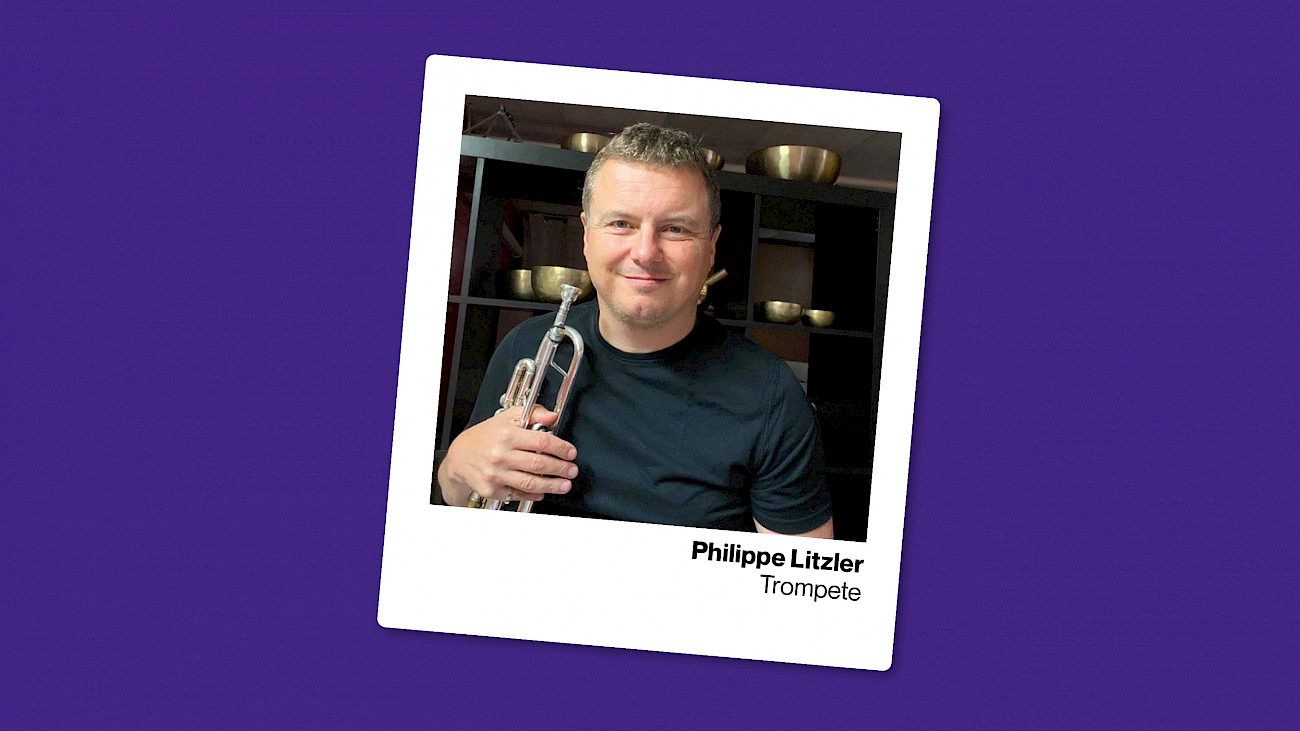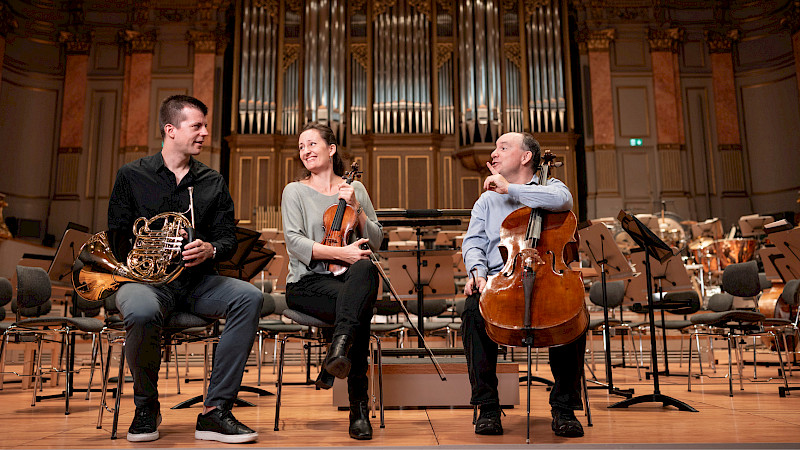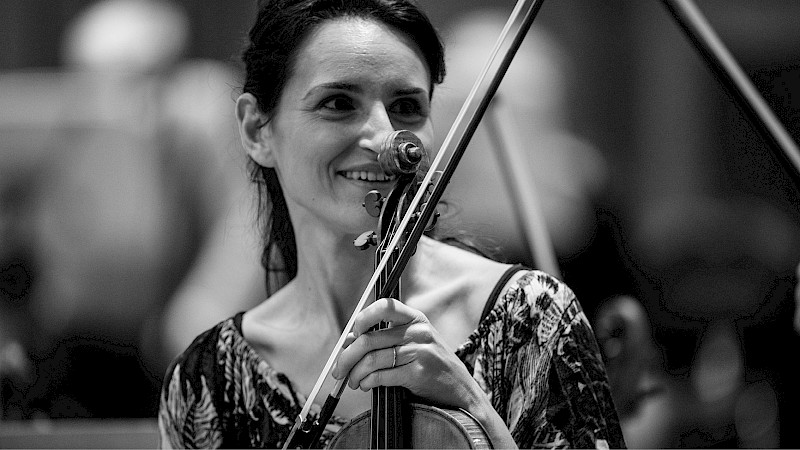
Thrilling signals from the back rows
Philippe Litzler is principal trumpeter with the Tonhalle-Orchester Zürich. His playing is warm and brilliant, like sparkling champagne. His instrument is his most loyal friend – even if he once almost became estranged from it.
Philippe Litzler plays the opening bars of Mahler’s Fifth Symphony. The silence in the hall belongs to him alone. The sound of his trumpet is brilliant – funeral march or not. His orchestra, his current Chief Conductor, his audience. Every seat is occupied: an October evening in the Tonhalle Maag. “Super,” Philippe says. Ever the enthusiast, this is a word that he uses frequently. “At that moment, you believe you can fly. Generally speaking, Paavo trusts everyone and anyone, spurs them on to perform. The orchestra is ready. There is potential for feelings of joy for everyone in the concert hall.” Precisely: “Super.”
Things haven’t always been super. Philippe, whose laugh is infectious, hasn’t always succeeded in turning things around and going through life with a fundamentally optimistic attitude, as he has learned to do today, at fifty. Scarcely had he taken up his position as principal trumpeter with the Tonhalle-Orchester Zürich fifteen years ago than he descended into a profound crisis. To be precise, his instrument no longer did what he asked of it. “It was as if I had a foreign object in my hands.” Burnout? “Perhaps,” he says on the phone from his home in Saint-Louis, Alsace. “I was tripped up by my ego,” he remarks. “I set myself impossible hurdles and couldn’t accept that I had suddenly lost all sense of ease and was no longer able to focus on achieving my goals fast, as I had done previously. Nobody noticed. Despite my despair, I managed to wrest those performances from myself.”
Master of the chakras
Philippe sought help. Antidepressants were out of the question. He refused such medication and instead visited a naturopath to learn about Reiki. It was a turning point in his life. Reiki, the energy found in all life, helped him find his way back to music – and to himself.
“It was magical. The chakras flowed again.” So enthusiastic was Philippe that he immersed himself in the subject and trained on all four levels known to the concept. Today, he provides massage himself, is a Reiki master and treats people in his home; he also includes singing bowl therapy in his treatments. Since discovering Reiki, he says, he has stayed away from anything that pulls on him or drains his energy, and he is free.
Provided they are open to it, Philippe also passes on the basics of energy theory to his students. He holds a professorship at the Institute for Classical and Church Music at the Lucerne University of Applied Sciences and Arts, which he would like to give up in a year’s time, since he wants to be more focused and to find more peace for his orchestral and energy work. After all, as well as his full-time job as principal trumpeter, he commutes by train between Zurich and Basel, where his scooter is parked to take him to Saint-Louis. Philippe lives there with his wife, whom he married in 1995 – he met her in the municipal orchestra, where she played the clarinet. They have a grown-up daughter, who now only comes to visit. Her studies took her to the South of France and her work to Paris, where she is a 3D graphic designer for video games.
King of Saint-Louis
Saint-Louis is the centre of Philippe’s life, and he couldn’t imagine living anywhere else. Commuting was part of his life from an early age – almost as long as music has been. He was four when his father took him to the rehearsals of the local fire brigade’s fanfare band, which he conducted. Philippe was given a bugle and played. Word soon spread: Radio France Alsace came to see the little regional wunderkind for themselves. “I piped in a few military signals, but I actually thought the coolest thing was the uniforms.” Without them, he might not have found music at all, he says, laughing his hearty laugh. At any rate, by the age of six he was playing the flugelhorn in the city orchestra, eventually switching to the trumpet, and knew at twelve that this would be his profession. “In Saint-Louis, I was king.”
Then came Paris. Philippe was no king there. He didn’t stand a chance when he auditioned at the Conservatoire at the age of 15. But giving up was out of the question. Pierre Thibaud was teaching at the Conservatoire National Supérieur de Musique et de Danse de Paris, and Philippe was determined to study with him. Thibaud listened to him, encouraged him to take the baccalaureate, and from then on gave him private lessons in his cellar. And so, for four years, the 15-year-old took the night train to Paris every Tuesday evening, played for four hours and travelled back on the train for another seven. He was allowed to skip school on Wednesdays. Thibaud was proven right: after graduating from high school, Philippe was accepted at the Conservatoire, where he studied for another four years with his “strict teacher with a heart of gold.”
Had Philippe not been so obsessed with his instrument, at that point he would certainly have left Paris, which he loathed and about which he can rant heartily and at length. Again and again, he applied for orchestral positions in different cities. Either he didn’t make the cut because he lacked orchestral experience, or they believed that he wouldn’t play second trumpet for long and would soon resign. And so it happened that his very first job was that of principal trumpeter with the Orchestre National de France. Again he commuted – one week in Paris, one week in Saint-Louis with his wife. He would probably have stayed in Paris to this day if – once their daughter was born – his homesickness hadn’t become more unbearable with every year. When he heard about the vacancy in Zurich in 2005, he travelled here, played – and is still playing to this day. Philippe appreciates the personal touch in the orchestra, which he had missed. He prefers to cultivate a non-committal attitude on social media rather than in real life. On Facebook he is in contact with the maximum possible number of 5,000 people, many of them colleagues in his field with whom he exchanges ideas. On stage, however, he wants more: intimacy in sound requires not only professionalism but, in the best case, devotion. “In the Tonhalle-Orchester Zürich, you aren’t just a number like in Paris. Here, there are friendships, cohesion and respect.” For his fellow trumpeters, for example: “All of them are champagne trumpeters, originally from the French school,” says Philippe. The French school is characterised by its brilliant, elegant timbre – even if each of his three colleagues contributes different qualities and nuances. The alchemy is simply right. Precisely: “Super.”





